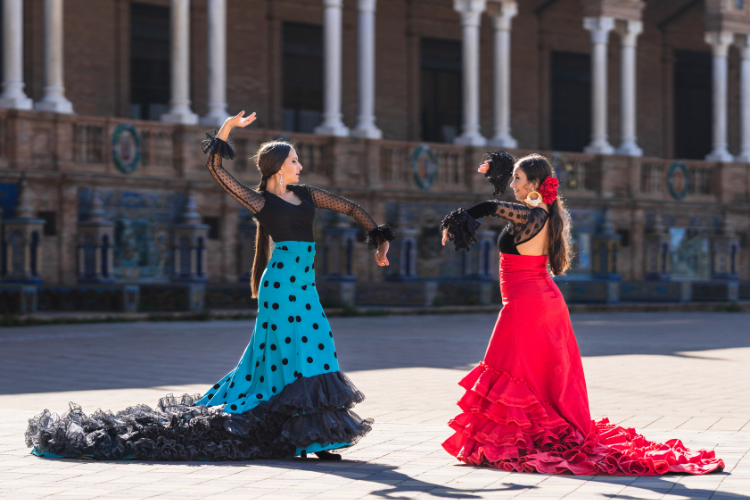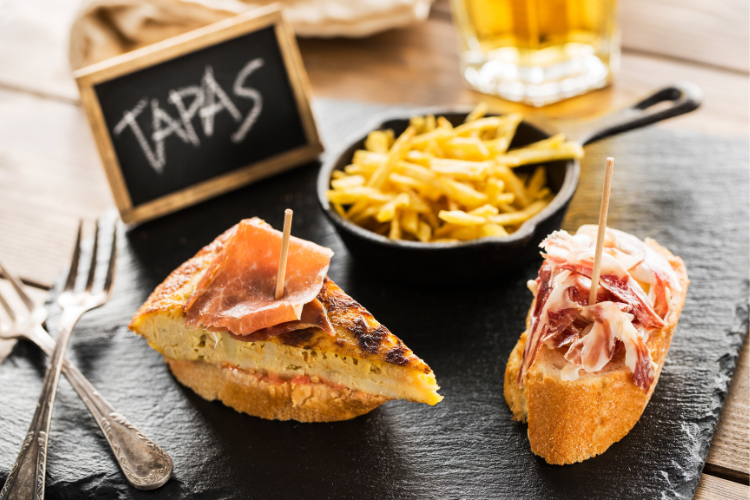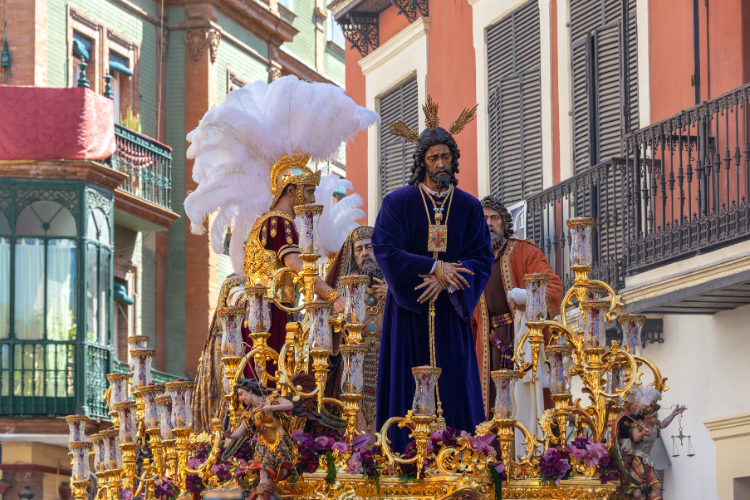Last Updated on September 10, 2024 by Laila Oliveira
Spanish culture is one of the many obvious reasons why people wish to relocate here. It’s vibrant, it’s colorful, it’s exciting! But with all of that, some Spanish traditions will catch you off guard.

As a new expat in the country, you’ll experience culture shock at least once in the first week of being here – even if you’ve watched a dozen videos before your flight. Just know that it’s okay and you’re allowed to learn at your own pace. Keeping that in mind, as your relocation guide, we want to help you be mindful of a few things.
What does day-to-day life look like? Are people friendly and welcoming? How long are lunch breaks usually for? The most important do’s and don’ts for new expats? Keep reading as we highlight everything you should keep in mind!
Why Must An Expat Learn About Spanish Culture Before Relocating?
Imagine welcoming a guest to live in your home for a month, and they don’t follow your basic house rules: they don’t bring shoes inside, eat food in the bedroom, or listen to loud music late at night.
It sounds like an extreme inconvenience, doesn’t it?
That’s exactly how disrespected locals would feel if you weren’t mindful of Spanish culture. While it’s normal to have differences in upbringing, as an expat, it will help you integrate into the community faster if you spent time learning the culture and traditions.
To understand the Spanish way of life better, let’s take a closer look at the history, traditions, festivals, religious significance, and more!
Spanish Traditions Expats Should Know
As an expat in Spain, you’re going to come across some unique traditions of Spanish culture. While you might already know some of them, it’s important to learn as you go, so you can integrate into the community and respect the new culture you’re a part of.
Here are a few main traditions you’ll find interesting!
Siesta
The literal definition of Siesta stems from the Spanish term “sexta hora” which refers to when farmers would take a mid-day break to rest. Or take a break to avoid the hottest hours of the day.
Siesta is more of a habit-based tradition than an obligation everyone partakes in. Between 14:00 and 17:00, people like to take time off from work to rest or nap, as needed. This tradition has existed for centuries, and depending on the region, it could last till 18:00.
Don’t be shocked if you see shops being closed during the day – just plan accordingly!
It’s seen as an excellent way to recharge for the second half of the day, especially considering Spain’s hot climate.
You can actually find a similar practice in other parts of the world, such as Asia and Latin America.
- Check out the Types Of Visas For Spain: All Options For Expats.
Tapas Culture
Food is an important part of Spanish culture – and tapas is a delightful part of the table when you have a group of friends around!
Usually, people have breakfast around 10:30 and dinner around 22:00, which are both relatively light meals. Lunch is just before siesta time and is usually a more filling meal. Which leaves a lot of room for delicious snacks during the day.
Tapas is a platter of small portions of food, usually with cheese, olives, tortillas, calamari, nuts, and vegetables. Each region, city, and bar has a specific tapas that’s popular, and it can often be a fun activity to explore different kinds. In some bars, you’ll get free tapas any time you buy a drink.
You’ll be surprised to find out that people plan tapas gatherings where they pool in money and try out new types of tapas. And they’ll assign the most responsible friend to manage the entire order and billing.
As a new expat, it’s okay to be overwhelmed and not know which tapas to order. Don’t fret! If there’s a menu on display, just point towards it if you’re still learning how to pronounce some words in Spanish. Remember, it’s meant to be fun!

Flamenco
Art is a big part of Spanish culture; Flamenco is just one aspect of it. Originating from Andalucía, Flamenco expresses deep emotions through music and dance.
This form of art focuses on a unique expression of feelings, using a combination of singing, dancing, and a guitarist. Originally, it did not include any music but just lyrics and hand clapping, called “toque de palmas.”
Nowadays, many Flamenco performers are being trained professionally. While this was not the case before. It was often passed down from generations, or taught by relatives, neighbors, or friends.
As an expat, you may not understand the significance in the beginning, but we encourage you to explore a few shows and prepare to be stunned by the performance!
- Read Also: The 15 Cheapest Cities To Live In Spain In 2024.
Bullfighting
Bullfighting remains one of the top 10 activities in traditional Spanish culture. It involves a highly trained professional, called a torero or matador, and a very powerful bull. While it may have lost some popularity in recent years, it’s still considered an expression of art.
The bullfighting season starts in early Spring, around March, and continues till Fall, around October. Each bullfight is divided into three main stages: picadores (lancers on horseback), bandilleros (flagmen), and lastly, the torero emerges with a shiny sword and red cape.
Whether you’re one of those who are intrigued by it or one of those who hate it, bullfights are a part of Spanish culture and excite viewers from all over the world.
Festivals and Celebrations
Onto some fun Spanish traditions that are actually highlighted quite a bit on social media!
As an expat, you don’t have to love every single part of the celebrations, but take time to learn about Spanish history and why people love certain festivals so dearly!
La Tomatina: Spain’s Famous Tomato Fight
Not to exaggerate, we’ve always wanted to be a part of this festival!
It is said to be the biggest food fight in the world and it’s a famous tourist attraction for those visiting in August.
It all started in 1945 when a food fight broke out between two groups of young adults (mostly men). Although, it is said that it didn’t begin with bad intentions, it was rather a prank that escalated into something bigger.
La Tomatina is now a yearly tradition on the last Wednesday of August, with thousands of people participating every year.
It’s estimated that around 120 tons of tomatoes are loaded onto 6-7 lorries that stop at particular routes to help include everyone in the fun. There are only five rules: no foreign objects, squash tomatoes before throwing them, be respectful and fair, follow instructions, and have fun!
Semana Santa: Holy Week Processions
Semana Santa (Holy Week), also referred to as “Easter in Spain”, is one of the most important religious festivals of the year.
The festival begins on Palm Sunday and finishes on Easter Sunday, totaling to a week of processions. Many towns and cities host their own kind of procession, recreating various episodes from the Passion and Resurrection of Christ.
The processions, or parades, involve floats with religious imagery or sculptures, and drums and music/singing.
Semana Santa originated in the 16th century when the Catholic Church believed these processions to be the best way to explain the religious events to people. You’ll find that the most important celebrations take place in Seville on the Via de la Plata and Ferrol on the Camino Ingles.

Feria de Abril: Seville’s Annual Spring Fair
Also known as “The April Fair,” Feria de Abril is Seville’s most popular festival! It’s held two weeks after Easter and features vibrant ” casitas” (tents) that bring families together.
It’s essentially a week-long celebration of dancing, singing, and drinking that takes place in the upper-class neighborhood of Los Remedios. The area is divided into 15 purpose-built streets, with pop-up tents and lots of flamenco.
Many locals welcome foreigners to their private casitas (which are usually inaccessible to the public). This allows new expats to immerse themselves in Andalusian culture and learn more about the celebrations. Remember, this makes it even more important to be respectful and to integrate into the community more.
Let’s Move to Europe
With Viv Europe your plans for Europe will come to a reality
Family and Social Values in Spain
Being close to family is one of the most important values in Spanish culture.
While recent trends might have changed things slightly, family gatherings are a priority, even if held only on the weekends.
It is common for young adults to continue living with their parents until they are ready to move abroad or find a partner. One reason for nuclear families could potentially also be the economic situation, but that’s another debate.
Families have close bonds even after the children get married and have their own lives to focus on. Grandparents actively participate in the lives of their grandchildren and often spend a lot of time with them.
It’s really heartwarming to see families prioritize Sunday lunch/brunch and meet up whenever they have time. Nothing quite brings people together like food does!
Spanish Work Culture
Similar to other southern European countries, like Portugal, Spain values a balanced lifestyle. As stated above, there’s a special focus on family relationships and having personal time.
With that being said, this does not mean that time is of no importance and the slow pace of life reflects everywhere. Punctuality is preferred and is an important part of the work culture, especially for meetings. It is appreciated that you be present before time and do not leave things to be completed just prior to the deadline.
And you might want to polish up those interpersonal skills to include small talk as part of your daily routine. While small talk is not appreciated all over the world, it is an important part of building strong professional connections in the workplace.
Lastly, Spanish culture values teamwork and collective success over individual achievements. It’s important that the entire team feels at ease, promoting trust and collaboration.
Religion & It’s Role
While active religious practice has decreased in recent years, Catholicism still shapes national identity and values. Religious weddings, baptisms, and funerals remain important for many families, even if they do not regularly attend church.
Many aspects of Spanish culture and art are heavily tied to religious significance and traditions. Even art and architecture reflect the importance of religion in Spain. Landmarks like the Sagrada Familia in Barcelona, the Alhambra’s coexistence of Catholic and Islamic influence, and El Greco’s religious paintings are just a few examples.
However, in recent years, there has been an increase in secularism, especially in the younger generations. This can be seen in the decreasing number of church attendance and a growing number of atheists and agnostics.
Regardless of the religious significance, the Spanish are progressive and value openness to diverse lifestyles, gender equality, and LGBTQ+ rights.
- Does Spain make it to the list of The 12 Most LGBTQ-Friendly Countries In Europe? (Spoiler: Yes, it does. Read more about LGBTQ rights in Spain!)
Important Do’s and Don’ts for Expats
Focusing on cultural appropriateness, here are a few do’s and don’ts that you might benefit from as a new expat moving to Spain.
| Do’s | Don’ts |
|---|---|
| Learn basic Spanish phrases before relocating. | Don’t assume everyone speaks English (they’re not supposed to). |
| Dress stylishly, even casually. | Don’t rush meals. |
| Be punctual at social events. | Don’t interpret closeness as an intrusion. |
| Embrace the “siesta” culture. | Don’t make negative comments about family or close-knit relationships. |
| Be patient with bureaucracy. | Don’t bring up sensitive political topics, especially Catalonia and Basque Country issues. |
Are You Drawn To Spanish Culture?
Thousands of expats have shown increasing interest in Spanish culture and relocating to the country. Visa options include the Non-lucrative visa (for passive income earners), the Digital Nomad visa, the business visa, and the Golden visa.
If you’re interested in exploring your eligibility to live in Spain as an expat, book a free consultation with our experts! At Viv Europe, we pride ourselves on offering seamless relocation services to meet the unique needs of individuals and families moving to Europe.
See you soon!





